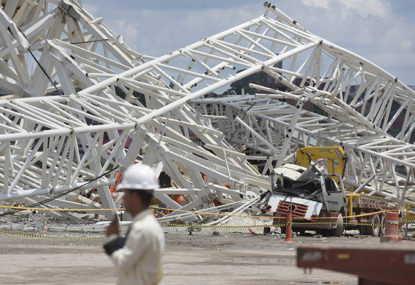'An iconic roster': LeBron, Steph, KD headline all-star cast for Team USA's shot at Olympic glory
LeBron James is going back to the Olympics for the first time in 12 years. Steph Curry is headed to the games for the…

Faced with the imminent end of its magical Michael Phelps-Usain Bolt era, imploding bidder interest, a nervous Rio outlook, and disquiet about its privileged business model, the Olympics could not be in better shape, thank you very much.
After all, in the race for the global brand-worth gold medal, it often shares a podium finish with Apple and Google.
Not bad for having its product on the shelves for just a month or so every four years, compared to its above-mentioned podium pals whose hardware barely ever leaves our gaze.
RIO EVENTS SCHEDULE
2016 RIO OLYMPICS BASKETBALL SCHEDULE
And that’s part of the problem, if there is one, because the Olympics is essentially a circus whose every act can decide its future. A drunk clown here, an incompetent juggler there, a tent collapse, and suddenly the cheers become jeers and you’re run out of town. The minutae of its choreography must be staggering.
So it seems obvious the recent signs of incompetence from Rio are by far the most pressing of the IOC’s looming concerns. From the Zika virus to dengue fever, presidential impeachment, polluted venues and structural collapses, this may be the toughest Olympic juggling act ever.
One wonders whether the decision to embrace Latin America into the Olympic family wasn’t one based on a kind of ideological promiscuity married with corporate speculation, based on Brazil having charged into eighth place in world GDP rankings at the time of bidding.
“The preparations are now worse than Athens,” lamented an exasperated IOC vice president John Coates recently.
You could also question the wisdom of expecting even the most sport crazy populace to support the planet’s two biggest sporting shows within two years (after Rio’s hosting of the Football world cup in 2014). Surely public fatigue or complacency was anticipated.
Several months out, the delivery of a safe but lacklustre Rio Olympics might be all IOC leaders dare hope for. In any case, a comforting lurch back to mother Europe is almost assured for the next host city, with the 2024 Games to be decided next year from a record low of four candidates: Rome, Paris, Los Angeles and Budapest.
The recent decline in bid nominations (11 for 2004, ten for 2008, nine for 2012, seven for 2016, six for 2020, four for 2024) may be seen as a worrying trend, or rationalised as a maturing of the bid process, given the monopoly money implications of even modelling a bid.
No more submissions based on a dictator’s impulse to gift his sports minister son a birthday present – or some over zealous tourism minister’s logo pipe-dream, e.g., anyone for a Dublin O’lympics?
What sort of hole the inevitable absence of the Phelps-Bolt lustre will leave is anyone’s guess. To contemplate the departure of a man regarded by some as the fastest of our kind ever to stride the earth is not an easy concept to process.
For a species often maligned as being the poor cousins of animal athleticism, Bolt’s measured 40kph speed almost made us look Serengetti-proof. And will the legacy of Phelps’ almost imponderable gold medal tally induce a kind of lingering defeatism?
Finally, as a corporate entity, the Olympics enjoys an enviable near immunity against financial failure,often leaving host cities to tidy the bottom line. Of all brands, the Olympics alone can oblige nations to legislate to protect its trading interests.
From a modest $1 million profit in 1960 at Rome, its broadcasting and endorsement spin-offs by London had grown to several billion. Seemingly, the vestigial goodwill of a charter drawn up more than a century ago, and based on amateurism, is still enough to perpetuate such license.
To counter growing bidder aversion and fellow corporate cynicism, it may be time to consider greater host incentive. Perhaps a standard two-Olympics tenure might allow deserved economies- of- scale benefits from infrastructure investment the second time around.
It might also be a good time to reflect on the enormous good fortune of having acquired a brand name with millennia of goodwill without having handed over a cent.